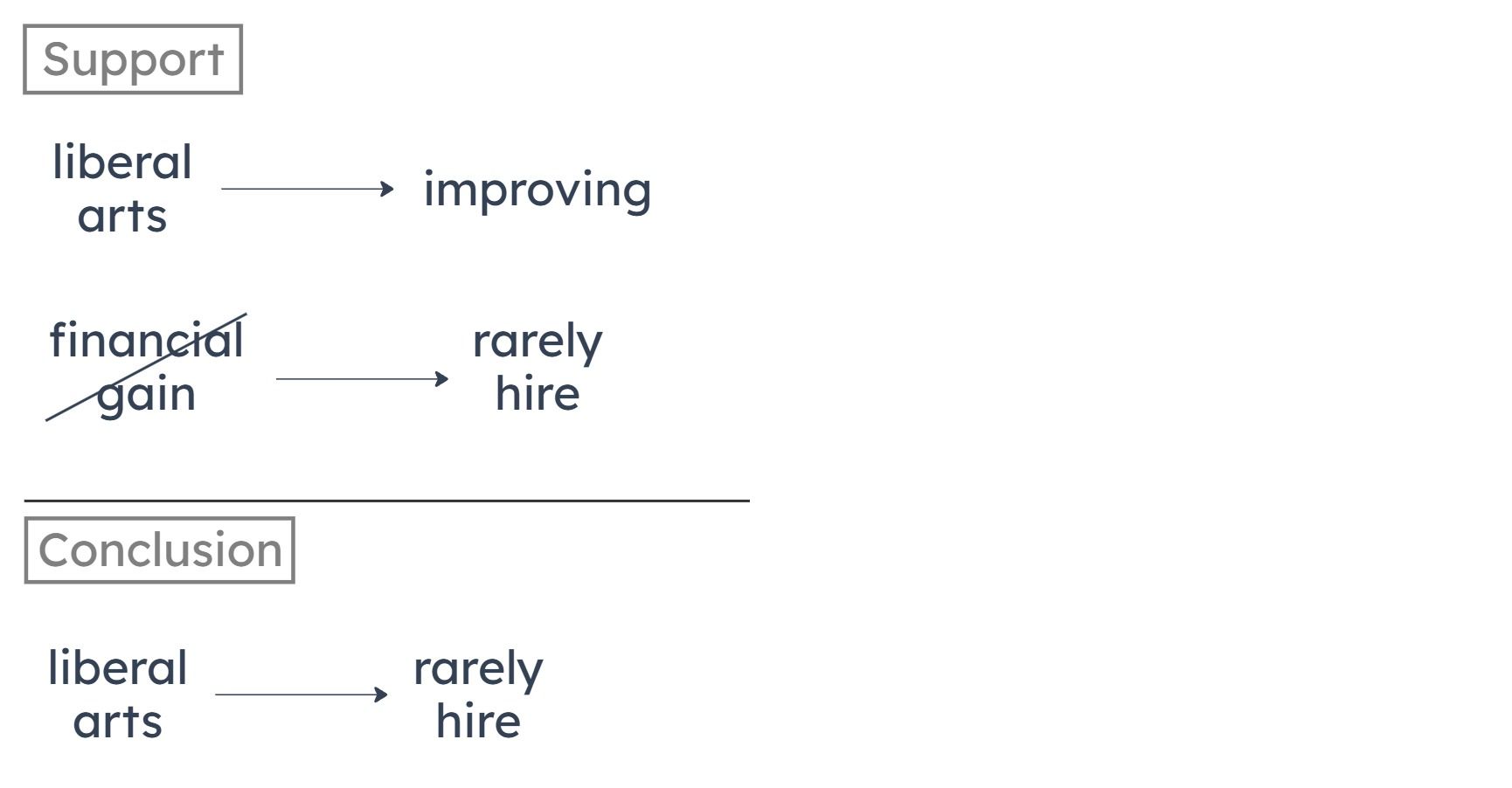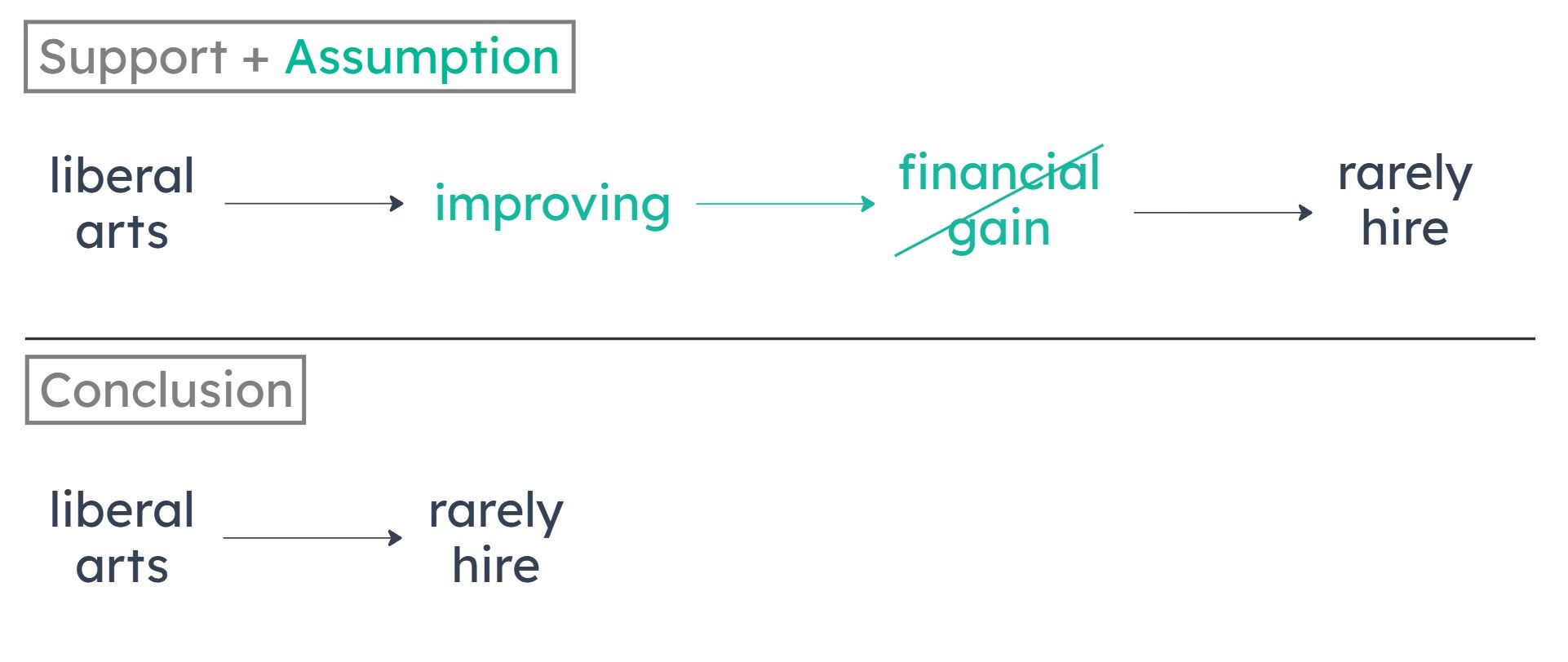LSAT 120 – Section 4 – Question 15
LSAT 120 - Section 4 - Question 15
October 2005You need a full course to see this video. Enroll now and get started in less than a minute.
Target time: 1:36
This is question data from the 7Sage LSAT Scorer. You can score your LSATs, track your results, and analyze your performance with pretty charts and vital statistics - all with a Free Account ← sign up in less than 10 seconds
| Question QuickView |
Type | Tags | Answer Choices |
Curve | Question Difficulty |
Psg/Game/S Difficulty |
Explanation |
|---|---|---|---|---|---|---|---|
| PT120 S4 Q15 |
+LR
+Exp
| Sufficient assumption +SA Conditional Reasoning +CondR Link Assumption +LinkA | A
16%
157
B
14%
158
C
19%
160
D
3%
156
E
48%
165
|
153 162 172 |
+Hardest | 146.628 +SubsectionMedium |
J.Y.’s explanation
You need a full course to see this video. Enroll now and get started in less than a minute.
Summary
The author concludes that if you have a doctorate in the liberal arts, companies will rarely hire you. This is based on the following:
If you have a doctorate in the liberal arts, you are interested in improving your intellect.
If you are not concerned with the financial gain that you can get in the business world, then companies will rarely hire you.
If you have a doctorate in the liberal arts, you are interested in improving your intellect.
If you are not concerned with the financial gain that you can get in the business world, then companies will rarely hire you.

Missing Connection
We’re trying to prove that people with doctorates in the liberal arts are rarely hired by companies.
We have a premise that leads to “rarely hired by companies” — if we can learn that people with doctorates in the liberal arts are not concerned with financial gain, that will establish that they are rarely hired by companies.
How can we prove that people with doctorates in the liberal arts are not concerned with financial gain? Well another premise tells us that people with doctorates in the liberal arts are interested in improving their intellects.
If we can show that “interested in improving intellects” leads to “not concerned with financial gain,” that will establish that people with doctorates in the liberal arts aren’t concerned with financial gain, which will in turn establish that they are rarely hired by companies.
We have a premise that leads to “rarely hired by companies” — if we can learn that people with doctorates in the liberal arts are not concerned with financial gain, that will establish that they are rarely hired by companies.
How can we prove that people with doctorates in the liberal arts are not concerned with financial gain? Well another premise tells us that people with doctorates in the liberal arts are interested in improving their intellects.
If we can show that “interested in improving intellects” leads to “not concerned with financial gain,” that will establish that people with doctorates in the liberal arts aren’t concerned with financial gain, which will in turn establish that they are rarely hired by companies.
A
Companies would hire people with doctorates in the liberal arts if such people were interested in the money available in the business world.
We’re trying to show that people with doctorates in liberal arts are rarely hired. To do this, we want to show that people with doctorates in liberal arts are not interested in financial gain. Learning what happens to people with doctorates in liberal arts if the ARE interested in financial gain doesn’t establish that these people are NOT interested in financial gain.
B
Some people who are interested in the liberal arts do not care about money.
We don’t know whether people with doctorates in the liberal arts are among the “some people who are interested in the liberal arts” in this answer.
C
The only people not interested in making money in the business world are people who are interested in improving their intellects.
“The only” introduces a sufficient condition. (”Only” without “the” before it introduces necessary.) So (C) tells us that IF you’re not interested in making money, then you’re interested in improving intellect. But this reverses what we want. We want to know that if you’re interested in improving intellect, then you’re not interested in financial gain.
D
People with doctorates in the liberal arts are interested in employment in the business world.
(D) doesn’t establish that people with doctorates in the liberal arts are not interested in the financial gain of the business world. So it doesn’t prove that people with doctorates in the liberal arts are rarely hired by companies.
E
Only people not concerned with making money in the business world are interested in improving their intellects.
“Only” introduces a necessary condition. So (E) tells us that if someone is interested in improving intellect, then that person is not concerned with making money in the business world. This provides the missing link between the two premises, which allows us to conclude that people with doctorates in the liberal arts are rarely hired by companies.

Take PrepTest
Review Results
LSAT PrepTest 120 Explanations
Section 1 - Logical Reasoning
- Question 01
- Question 02
- Question 03
- Question 04
- Question 05
- Question 06
- Question 07
- Question 08
- Question 09
- Question 10
- Question 11
- Question 12
- Question 13
- Question 14
- Question 15
- Question 16
- Question 17
- Question 18
- Question 19
- Question 20
- Question 21
- Question 22
- Question 23
- Question 24
- Question 25
- Question 26
Section 2 - Reading Comprehension
- Passage 1 – Passage
- Passage 1 – Questions
- Passage 2 – Passage
- Passage 2 – Questions
- Passage 3 – Passage
- Passage 3 – Questions
- Passage 4 – Passage
- Passage 4 – Questions
Section 3 - Logical Reasoning
- Question 01
- Question 02
- Question 03
- Question 04
- Question 05
- Question 06
- Question 07
- Question 08
- Question 09
- Question 10
- Question 11
- Question 12
- Question 13
- Question 14
- Question 15
- Question 16
- Question 17
- Question 18
- Question 19
- Question 20
- Question 21
- Question 22
- Question 23
- Question 24
- Question 25
- Question 26
Section 4 - Logical Reasoning
- Question 01
- Question 02
- Question 03
- Question 04
- Question 05
- Question 06
- Question 07
- Question 08
- Question 09
- Question 10
- Question 11
- Question 12
- Question 13
- Question 14
- Question 15
- Question 16
- Question 17
- Question 18
- Question 19
- Question 20
- Question 21
- Question 22
- Question 23
- Question 24
- Question 25
- Question 26
Leave a Reply
You must be logged in to post a comment. You can get a free account here.